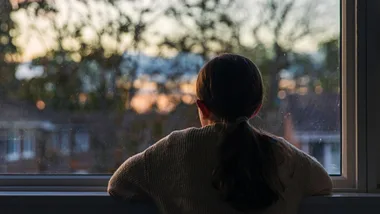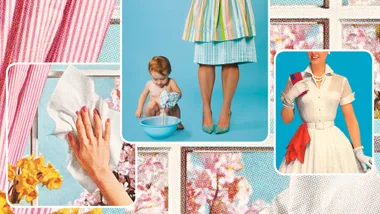Whether you’re planning to book a spot at your local prenatal yoga class in 2020 or the year after, it’s never too early to start preparing for being pregnant. And while we know that our diet, exercise and stress levels are big factors (hello, modern life!), nutritionist and co-author of Healthy Hormones, Belinda Kirkpatrick, believes that how we live our lives at home can also affect our health and our ability to fall pregnant.
“The toxins found in our homes can have a negative and sometimes disastrous impact on our health and our hormones,” she explains. “Multiple research studies have shown that common toxins such as BPA, phthalates, parabens, pesticides and flame retardants are found not only in most of our bodies, but also in cord blood, amniotic fluid and the bodies of our unborn babies.”
She adds that this is particularly alarming, as we know that exposure to these chemicals during fetal development can “increase the risk of birth defects, childhood morbidity, preterm birth and hormonal disturbance”.
But don’t worry if reducing toxins in your home altogether feels like too big a job to tackle in your household. Kirkpatrick says the biggest mistake people make is feeling overwhelmed or thinking that these changes have to be expensive or happen all at once.
“It may take years to implement these changes and that is OK!” she says. “Slowly make changes as your budget allows. Each change you make is a step towards happier hormones, better fertility for you and your partner, and better health for you and your family.
Step 1: Reduce Your Chemical Footprint
The first area to look at, according to Kirkpatrick, is how many chemicals we use in our home to clean. Her first rule of thumb is to check the packaging for signs that the product might not be the best choice.
“Ditch any cleaning product that has a hazard symbol on the back (or a link to the poisons hotline),” she explains. “It’s fairly safe to bet that a product containing these things is toxic to your health and hormones.”
But even if there isn’t a hazard symbol, Kirkpatrick says the majority of the cleaning products she sees on shelves contain ingredients that can be harmful to your health and the environment.
“Most commercial cleaning products contain endocrine-disrupting chemicals (EDCs), also known as hormonal disrupters, and these can affect your fertility, metabolism, immune system and more,” she explains. “These chemicals can easily enter our bodies when we breathe them in, touch them
or actually consume them.” Instead, she says to look for natural cleaning products and washing detergent that is plant-based and non-toxic, or simply make a multipurpose cleaning spray using vinegar and water. Plus, she recommends ditching plastic in favour of glass, Pyrex or metal, as chemicals from the plastic containers can leach into our food over time.
And don’t forget to look in your bathroom cupboard, too. You don’t need to throw out anything that is full; just look for a natural alternative as you finish a bottle of shampoo, perfume, lipstick or mascara, Kirkpatrick says.
Step 2: Clean Your Air
The World Health Organization has estimated that 4.3 million people die from indoor air pollution every year, and while we’re fortunate in Australia to not be affected as much as some other countries, the air pollution in your home is still important to your health. There are products on
the market, such as air purifiers, which are popular, but a cheaper alternative is to invest in plants that filter the air while you sleep.
NASA’s famous Clean Air Study, which looked at ways to clean the air in space, showed that plants can help remove pollutants effectively and efficiently. They recommended the best varieties for your home, and our picks are the devil’s ivy, Boston fern, bamboo palm and peace lily.
However, for Kirkpatrick, one of the best ways to improve air quality is to not introduce toxins at all. “I recommend my clients stop using air fresheners or candles that contain artificial fragrances (read: nearly all of them!), and switch to diffusing essential oils, beeswax or soy candles scented using 100 per cent pure essential oils,” she advises.
Step 3: Go Organic
Buying organic food can be expensive, but making the switch can reduce the pesticides and chemicals you consume. If you’re on a budget and can’t afford to buy everything organic, you could try only buying “high-risk” produce, such as spinach, strawberries and tomatoes, or investing in a plant-based organic fruit wash. If you have outside space, Kirkpatrick recommends starting a vegie patch or growing herbs in pots on windowsills so you can enjoy fresh, organic produce of your own. Buying organic doesn’t just extend to the kitchen either; she also recommends investing in certified organic cotton or bamboo bedding, which is hypo-allergenic and contains no toxic chemical residues, which can be found in conventional materials.
Step 4: Tidy Up
Lastly, Kirkpatrick suggests living in a neat home rather than one filled with clutter. Not only does it make it easier to clean, it’ll also have a calming effect on you the moment you walk in the front door, and the moment you get into bed.
“We spend (or should spend) at least eight hours every night in our bedrooms, so that time can really help or potentially hinder our health,” she says. “I recommend keeping it tidy and as well-ventilated as possible.”
And one last piece of advice, which she knows is an uphill battle for some people, is to try to keep electrical devices out of the bedroom. “I think it’s important to charge your phone overnight in the kitchen, away from your bedside table,” she says, “not only to improve sleep but also to reduce exposure to electromagnetic radiation, which mounting research shows is harmful to sperm quality.”
Easy Switches
Add these to your everyday cleaning.
Bondi Wash Fruit and Vege Wash, $16, bondiwash.com.au
They say: “A 100 per cent natural blend using antibacterial Australian native ingredients to remove the chemicals, waxes, bacteria and pesticides from fresh fruit and vegetables.”
We say: “Easy to use and it doesn’t leave any taste.”
Palmolive Anti-Stress Soap-free Body Wash, $4.99, palmolive.com.au
They say: “Our body washes are made with skin-loving ingredients, natural extracts and great fragrances. We choose to leave out parabens, phthalates, alcohol, silicones, gluten, soap and BPA.”
We say: “It smells delicious and leaves skin feeling soft.”
Koala Eco Natural Laundry Wash, $24.95, koala.eco
They say “This biodegradable and eco-friendly, plant-based formula delivers a thorough and effective wash and is safe for sensitive skin.”
We say “Cleans very effectively and smells fresh.”
This article originally appeared in the February 2020 issue of marie claire.










